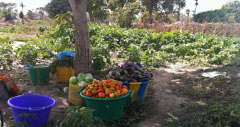
They raised this concern to this medium during an interview with this reporter after the presidential election.
Lamin Fatty, a farmer at Wassadou village in Foni, said causes of post-harvest loss at this stage include limited availability of suitable varieties for processing, lack of appropriate processing technologies, inadequate commercialisation of new technologies; lack of basic infrastructure and inadequate facilities and infrastructure.
He added that post-harvest losses and quality deterioration of horticultural crops are mostly caused by pests, microbial infection, natural ripening processes and environmental conditions such as heat, drought and improper post-harvest handling.
According to him, at processing level, post-harvest handling and the lack or inadequate storage facilities including cold storage affect many commodities mainly fruits, vegetables and legumes.
For example, he said, in the mango value chain analysis, the experts highlighted that most local mango varieties have shorter shelf life making them highly perishable. Therefore, processing them into juice and other products are good options to prevent or minimise post-harvest losses.
Omar Sey, another farmer in Kiang Central said proper storage facilities are crucial to prolong the shelf life of the food produced in the country. “Since most of the food loss happens at harvest time, it is necessary to develop storage facilities for cereals, vegetables, and fruits at community level.”
Sey said lack of proper facilities is forcing growers and farmers to sell the surplus produce immediately after harvest to avoid any losses. With appropriate storage facilities, farmers will not only reduce their losses, they would be able to meet the national demand for their produce and be in a better bargaining position allowing them to hold on to their produce till market prices are more favourable.
Fatoumatta Darboe, a vegetable grower at Pakalinding in Lower River Region (LRR), said the lack of cold storage is leading to significant losses in the vegetables and meat value chains. Tomato producers and traders know this all too well; because the vegetable is extremely perishable and cannot be preserved in fresh stages outside the cold storage chain, massive post-harvest losses are inevitable. But with an emerging processing factory in The Gambia, there are huge potentials for value addition on tomatoes, which will reduce post-harvest losses and create jobs for many more producers, especially rural women, and youth.
She said the poor transportation network is among the major causes of post harvest loss.
“Most of the farms are located off the road and therefore after harvest before the produce reaches the consumers, most of them get spoiled due to overheating and the high temperatures.”
Siaka Daffeh, an agriculturalist explained that inadequate marketing channels are another cause of post-harvest loss in The Gambia.
“There should be proper marketing channel after harvest but the problem of marketing is still persisting in The Gambia which leads to so many economical losses to the producers.”





